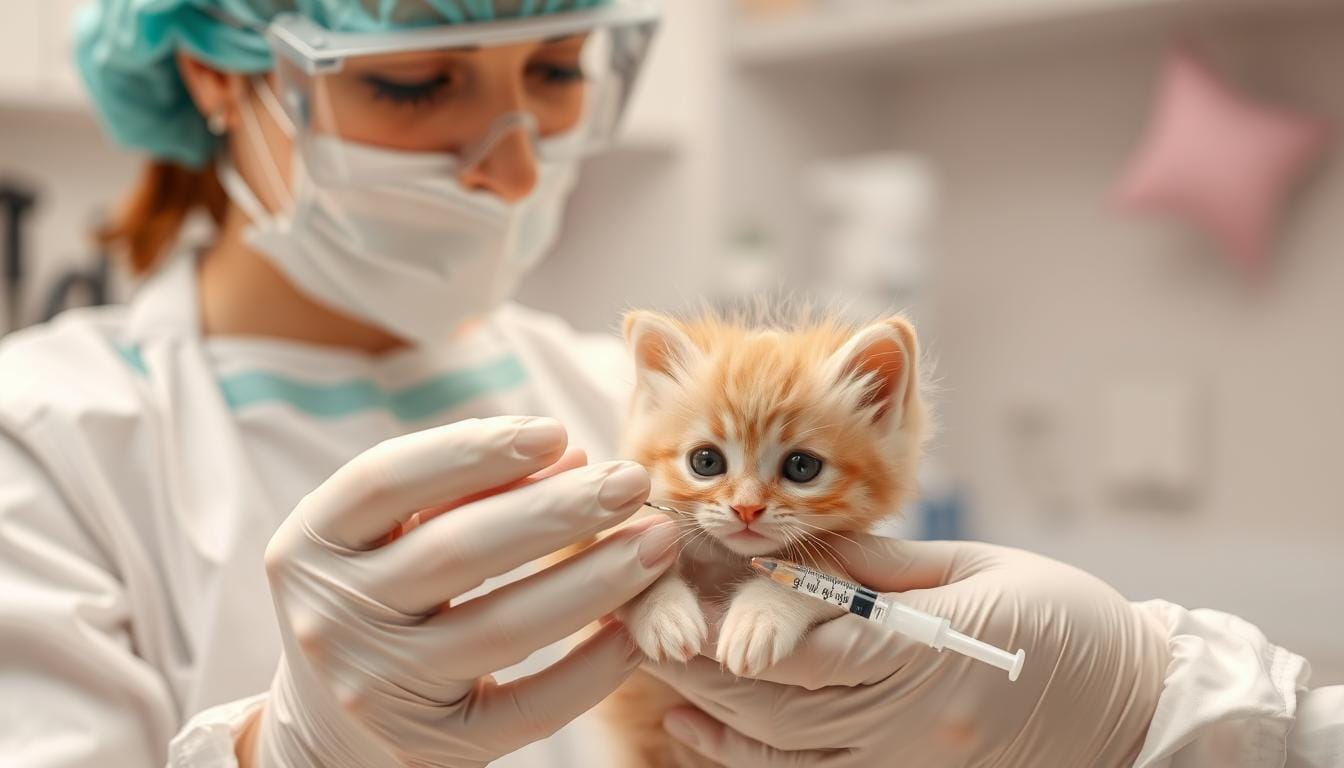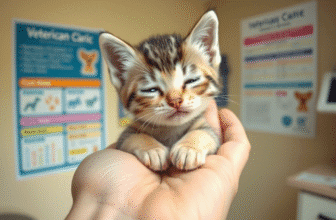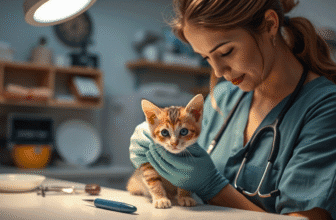
Table of Contents
Did you know 86% of kittens get intestinal parasites soon after birth? It’s vital to protect your kitten from diseases. Kittens’ First Shots are key to their health.
Knowing when to start and how to keep up with vaccinations is crucial. It ensures your kitten stays healthy for years to come.
Understanding the Importance of Kitten Vaccinations
Keeping your kitten healthy is a big deal, and shots are key. Kittens face many dangers early on, making shots very important. Knowing about kitten vaccinations and how they work helps your kitten start life strong.
Why Vaccinations are Crucial for Your Kitten’s Health
Kittens should get their first shots between 6-8 weeks old. The American Veterinary Medical Association says to give them shots every 3-4 weeks until they’re 4 months old. This is because maternal antibodies from mom give temporary protection. But, shots build up your kitten’s active immunity, which lasts longer and protects better.
The Role of Maternal Antibodies and Active Immunity
Kittens get some protection from mom’s milk. But, this protection fades over time, leaving them open to sickness. Shots help by making your kitten’s body make its own active immunity. This way, your kitten can fight off diseases like feline distemper and calicivirus. Studies show about 90% of kittens are safe after getting all their shots.
“Vaccinating your kitten is one of the best ways to ensure their long-term health and well-being.”
When Do Kittens Get Their First Shots?
Keeping your kitten healthy is very important. Vaccinations are key to their health. Kittens usually get their first shots between 6 to 8 weeks old. Then, they get boosters every 3 to 4 weeks until they are 16 to 20 weeks old.
This kitten vaccination timeline helps your kitten grow strong. The core shots, like FVRCP and rabies, protect them from common diseases.
The kitten vaccination schedule is very important. It helps your kitten’s body fight off diseases. As they grow, their own immunity starts to work.
“Kittens need multiple vaccinations at three or four-week intervals until they are about 16 weeks old.”
Following the when do kittens get their first shots schedule is crucial. It ensures your kitten gets the protection they need to stay healthy and happy.
Core Vaccinations for Kittens
Protecting your kitten’s health is key, and core vaccinations play a big role. The FVRCP vaccine is a must. It guards against three deadly feline diseases: feline rhinotracheitis, feline calicivirus, and feline panleukopenia.
FVRCP: Protecting Against Common Feline Diseases
The FVRCP vaccine is given in a combo shot. Your kitten will need several doses. This series boosts their immunity and keeps them safe from these diseases:
- Feline Rhinotracheitis: This viral infection causes sneezing and nasal discharge.
- Feline Calicivirus: It can cause oral ulcers and, in severe cases, death.
- Feline Panleukopenia: Also known as feline distemper, it’s highly contagious and can be fatal in kittens. It can also cause vomiting and diarrhea.
It’s vital to ensure your kitten gets the full FVRCP vaccine series. This core kitten vaccination protects them from these serious diseases. It’s crucial for their health and wellbeing.
| Vaccination | Protection |
|---|---|
| FVRCP | Feline rhinotracheitis, feline calicivirus, and feline panleukopenia |
“Vaccines are one of the most effective ways to prevent infectious diseases in pets. The FVRCP vaccine is a core vaccination that every kitten should receive to protect them from several potentially fatal feline illnesses.”
Rabies Vaccination: A Legal Requirement
Rabies is a deadly disease that can harm cats, other animals, and humans. As a pet owner, it’s key to get your kitten vaccinated on time. In the U.S., laws about kitten rabies shots vary by state. But, most say kittens should get their first shot between 12 to 16 weeks old.
There are two rabies vaccines for cats: one-year and three-year shots. The one-year shot needs more frequent doses than the three-year one. After the first shot, cats need a booster in a year. Then, they follow the vaccine schedule based on the type used.
Getting your kitten vaccinated is often the law because of the disease’s risks. Knowing and following local rabies laws is crucial. Your kitten’s lifestyle, wildlife exposure, and travel plans affect their vaccination needs. Always talk to your vet about the best vaccine plan.
| State | Minimum Age for Vaccination | Proof Required/Certificate | Penalty for Violation | Vaccine Exemptions |
|---|---|---|---|---|
| Alabama | By three (3) months of age | Printed certificate signed by veterinarian | Subject to a penalty not to exceed an amount equal to twice the state approved charge for immunization, in addition to the immunization fee. | Exemption may be granted if a rabies vaccination would be injurious to the animal’s health. |
| Alaska | Not specified | Rabies vaccination certificate signed by a licensed veterinarian | Confiscation, vaccination, or euthanization of animals not complying with vaccinations | Not listed |
| Arkansas | Four (4) months of age or older | Not Listed | Penalty not to exceed $1,000 for each violation; each day of a continuing violation may be deemed a separate violation | Not listed |
| Colorado | Not specified | Rabies vaccination certificate signed by a veterinarian | Considered a petty offense for non-compliance | Exemption may be granted if the rabies inoculation is contraindicated due to the animal’s medical condition |
| Connecticut | Three (3) months of age or older | Certificate issued by a licensed veterinarian | Violation is an infraction | Exemption may be granted if a rabies vaccination would endanger the animal’s life due to disease or other medical considerations. |
Regular rabies shots are key to keeping your kitten safe and stopping the virus spread. By following local laws and working with your vet, you can keep your kitten vaccinated and safe.
Non-Core Vaccinations: Assessing Your Kitten’s Risk
Your vet might suggest non-core vaccines for your kitten, based on their lifestyle and risks. The feline leukemia virus (FeLV) vaccine is one example. It’s especially important for kittens that go outside or meet other cats.
Feline Leukemia Virus (FeLV) Vaccine
The FeLV vaccine protects your kitten from the feline leukemia virus. This virus is very dangerous and can be deadly. Your vet will decide if the FeLV vaccine is right for your kitten, based on their lifestyle and risks.
Kittens need two doses of the FeLV vaccine, at 12 and 16 weeks old. This helps them build strong active immunity against the virus.
Always talk to your vet about your kitten’s risks and the right non-core kitten vaccinations. They can help your kitten get the best care and stay healthy.
The Kitten Vaccination Schedule
Keeping your kitten healthy is very important. A key part of that is making sure they get their vaccinations on time. The kitten vaccination schedule helps protect them from many common diseases.
Kittens get their first FVRCP vaccine at 6 to 8 weeks old. They need booster shots every three to four weeks until they are about 16 weeks old. The rabies vaccine is given around 16 weeks old and needs to be repeated every one to three years.
Some kittens also need the FeLV vaccine. This is given between 9 and 11 weeks old, with a second shot three to four weeks later. The FeLV vaccine protects against a serious virus that can harm your kitten’s immune system.
| Vaccine | Recommended Age | Number of Initial Doses | Booster Frequency | Average Cost Per Dose |
|---|---|---|---|---|
| FVRCP | 6-16 weeks | 3 | 1-year booster | $25-$70 |
| Rabies | 16 weeks | 1 | 1-3 years | $25-$50 |
| FeLV | 9-11 weeks | 2 | 1-year booster | $25-$70 |
The kitten vaccination timeline is key to building your kitten’s immunity. It protects them from serious diseases. Always talk to your vet to make sure your kitten’s kitten vaccination schedule meets their needs.
Cost Considerations for Kitten Vaccinations
Vaccinations are key to keeping your kitten healthy. But, they can be pricey. Luckily, there are ways to handle these costs without sacrificing your kitten’s health.
Each kitten shot costs between $15 and $45. You’ll need three shots for full protection, which totals $45 to $135. The FVRCP vaccine, vital for all cats, costs $20 to $40 per shot.
There are also shots for rabies and feline leukemia. These cost $20 to $30 and $25 to $45, respectively. Optional shots for chlamydia and Bordetella range from $20 to $40 and $10 to $30.
Preventive care for fleas, ticks, and heartworms adds to the cost. Prices range from $40 to $200, $25 to $120, and $20 to $40 for tests. Deworming treatments cost between $25 and $130.
| Vaccination | Cost per Shot |
|---|---|
| FVRCP | $20 – $40 |
| Rabies | $20 – $30 |
| Feline Leukemia (FeLV) | $25 – $45 |
| Chlamydia | $20 – $40 |
| Bordetella | $10 – $30 |
Vaccinations might seem expensive, but they’re crucial for your kitten’s health. Understanding the costs helps you plan a budget-friendly vaccination schedule. This way, your kitten gets the care they need without breaking the bank.
Potential Side Effects of Kitten Vaccinations
Kitten vaccinations are crucial for their health. But, pet owners worry about side effects. The good news is that most side effects are mild and go away fast.
Mild and Moderate Side Effects to Watch For
The most common mild side effects include:
- Discomfort or soreness at the injection site
- Mild fever or lethargy
- Reduced appetite
- Small, temporary lump or swelling
These symptoms usually last only a day or two. Moderate side effects are less common but can be more serious. They might include facial swelling, hives, vomiting, or trouble breathing. In rare cases, kittens can have a severe allergic reaction that needs quick vet care.
Keep a close eye on your kitten after shots. Call your vet if you see any worrying signs. Most kittens do well with shots, with little discomfort.
“Lumps felt after vaccination are generally part of the normal inflammatory response and usually resolve without intervention. However, lumps persisting for over 3 months or growing in size should be examined, as they could indicate a rare vaccine-associated sarcoma.”
Knowing about kitten vaccination side effects helps you prepare for shots. While mild side effects of kitten shots are common, moderate side effects of kitten shots are less frequent. Severe reactions are very rare.
Preventing Intestinal Parasites in Kittens
Kittens are very likely to get intestinal parasites like roundworms, hookworms, and tapeworms. These parasites can come from their mom or the environment. If not treated, they can be very harmful. Deworming your kitten is key to keeping them healthy.
The Importance of Deworming
Deworming medication is vital to get rid of these parasites. Vets usually start deworming treatments when kittens are 4-6 weeks old. This is because worms in kittens can live for 4-6 weeks.
Kittens need to be dewormed every 4 weeks until they are 6 months old. After that, they should be dewormed every 1-3 months. This is especially important because some cat worms can also affect humans, especially kids.
| Deworming Frequency | Approximate Cost |
|---|---|
| Every 4 weeks until 6 months old | $15+ per treatment |
| Every 1-3 months after 6 months old | $15+ per treatment |
Deworming meds start working in 2-4 days, sometimes needing a second dose. It takes 2-3 weeks for worms to be gone. Without deworming, kittens might show signs like diarrhea, bloody stool, and vomiting.
Not deworming can cause serious problems like intestinal blockages. These can cost a lot to fix, from $800 to $6,000 or more. Deworming regularly is worth it to keep your kitten healthy and avoid these big costs.

“Deworming your kitten is a crucial step in maintaining their overall well-being.”
Protecting Your Kitten from Fleas and Ear Mites
As a new kitten parent, you’ll want to keep your kitten healthy and safe from fleas and ear mites. These pests can make your kitten uncomfortable and even harm their health. Luckily, there are ways to prevent and manage flea and ear mite infestations in kittens.
Many flea control products for dogs are not safe for kittens. Always talk to your vet before using any flea or parasite prevention. Your vet can suggest safe, effective options to keep your kitten protected from these pests.
Ear mites are a big worry for kitten owners. They can make your kitten’s ears itch and get inflamed. Your vet can check your kitten and give the right treatment to get rid of the mites and ease the itchiness.
To maintain your kitten’s flea and parasite control, use a year-round preventative medication, as your vet suggests. This will help keep fleas, ear mites, and other parasites at bay and keep your kitten healthy and happy.
| Parasite | Symptoms | Prevention | Treatment |
|---|---|---|---|
| Fleas | – Intense itching – Hair loss – Skin irritation | – Year-round flea prevention medication – Regular grooming and flea combing | – Prescription flea control products – Thorough cleaning of environment |
| Ear Mites | – Head shaking – Ear scratching – Dark, waxy discharge | – Regular ear cleaning – Veterinarian-approved ear mite prevention | – Topical ear mite medication – Thorough ear cleaning |
By being careful and working with your vet, you can effectively protect your kitten from the discomfort and potential health risks posed by fleas and ear mites. With the right steps and quick treatment, your kitten can live a happy, healthy life without parasites.
Proper Nutrition for Your Growing Kitten
Kittens need special food because they grow fast. It’s important to give them high-quality kitten food. This food should have lots of meat protein.
Kittens usually stop growing at about 40 weeks. So, feed them kitten food until they are one year old. They need more protein, fat, and calories than adult cats. Their food should have 35-50% protein and 18-35% fat.
It’s key to control how much food kittens eat. Too much can make them fat. This can cause health problems like heart disease. Feed them 3-4 small meals a day to keep them healthy and active.
| Nutrient | Recommended Level for Kittens |
|---|---|
| Protein | 35-50% on a dry matter basis |
| Fat | 18-35% on a dry matter basis |
| Calcium | 0.8-1.6% on a dry matter basis |
Take your kitten to the vet regularly. This helps keep them healthy and growing right. A good diet is key for their growth and health all their life.
Choosing the Right Kitten Food
As your kitten grows, they need the right food for health and happiness. Look for kitten food with high-quality, meat-based protein as the main ingredient. Stay away from cheap brands that might not give your kitten the nutrients they need.
For the best food for your kitten, talk to your vet. They can suggest the top brands based on your kitten’s needs and health. This helps you choose the right food for your kitten.
Key Considerations for Choosing the Best Kitten Food
- Prioritize meat-based proteins as the primary ingredient, as they provide essential amino acids for your kitten’s growth.
- Look for kitten-specific formulas that are designed to meet the unique nutritional requirements of growing kittens.
- Avoid generic or low-quality brands, as they may not offer the necessary balance of nutrients.
- Consider wet and dry food options, as a combination can help ensure your kitten stays hydrated.
- Ensure the food is certified by the Association of American Feed Control Officials (AAFCO) for complete and balanced nutrition.
| Kitten Food Brand | Protein Content | Caloric Density | Wet or Dry |
|---|---|---|---|
| BLUE Life Protection Formula Kitten | 34% | High | Dry |
| Purina ONE Kitten Formula | 38% | High | Dry |
| Wellness CORE Kitten | 40% | High | Dry |
| Fancy Feast Kitten Wet Food | 11% | High | Wet |
Choosing the right kitten food brands and kitten food ingredients is key. It ensures your kitten gets the best nutrition for growth. Always ask your vet for advice on the best kitten food for your kitten.

Conclusion
Keeping your kitten healthy is very important. As a pet owner, you need to make sure they get the right vaccinations and care. This includes deworming, flea control, and a good diet.
It’s key to follow the kitten vaccination schedule. This includes important shots like FVRCP and rabies. Also, talk to your vet about extra vaccines your kitten might need. This depends on their lifestyle and where you live.
A happy kitten is a healthy kitten. By focusing on their health, you give them a great start. With the right care, your kitten will grow up strong and happy.
FAQ: Kittens First Shots
What are the first shots kittens need?
Kittens need the FVRCP vaccine (protection against feline rhinotracheitis, calicivirus, and panleukopenia). Some may also require the FeLV vaccine.
When should kittens get their first shots?
Kittens should receive their first shots between 6-8 weeks of age, with booster shots every 3-4 weeks until they are about 16 weeks old.
Why are vaccinations important for kittens?
Vaccinations protect kittens from deadly and contagious diseases, ensuring their health and preventing the spread of illness to other pets.
Do indoor kittens need vaccines?
Yes, even indoor kittens need core vaccines like FVRCP and rabies, as some diseases can be brought inside on shoes, clothes, or through open windows.
What is the FVRCP vaccine?
The FVRCP vaccine is a combination shot that protects against feline viral rhinotracheitis, calicivirus, and panleukopenia (feline distemper).
Are there side effects to kitten vaccinations?
Side effects are typically mild, including lethargy, mild fever, or tenderness at the injection site. Severe reactions are rare but should be reported to a vet.
How much do kitten vaccinations cost?
Costs vary but generally range from $20-$50 per vaccine. Some clinics or shelters offer discounted vaccination packages for kittens.
How often do kittens need boosters?
Kittens need boosters every 3-4 weeks until 16 weeks of age. Afterward, annual or tri-annual boosters are recommended based on the vaccine type.
Can I vaccinate my kitten myself?
While vaccines can be purchased, it’s safer and more effective to have a licensed veterinarian administer them and monitor for adverse reactions.
Source Links
- Recommendations for New Kitten Owners | VCA Animal Hospitals – https://vcahospitals.com/know-your-pet/vaccination-are-booster-vaccines-necessary-for-cats
- Kitten Vaccination Schedule and Costs – https://www.petmd.com/cat/general-health/kitten-vaccination-schedule-and-costs
- Kitten Vaccine Schedule For First-Year Shots [Chart] – https://www.pawlicy.com/blog/kitten-vaccine-schedule/
- When Should My Kitten Get Vaccinated? Scheduling Shots – https://harboursidevet.com/when-should-my-kitten-get-vaccinated/
- What Age Should Kittens Get Vaccines? | Main Street Veterinary Center – https://mainstreetvetcenter.com/blog/what-age-should-kittens-get-vaccines/
- Vaccination Schedule For Kittens: When Kittens Should Get Shots – https://www.forbes.com/advisor/pet-insurance/pet-care/kitten-vaccination-schedule/
- Vaccine Schedules for Cats & Kittens – https://www.smalldoorvet.com/learning-center/wellness/cat-kitten-vaccine-schedules
- Berkeley Dog & Cat Hospital – https://www.berkeleydogandcat.com/site/blog/2024/06/15/cat-vaccines
- Cat Vaccinations: What Vaccines Do Cats Need? – https://www.petmd.com/cat/general-health/cat-vaccinations-what-vaccines-do-cats-need
- Your Kitten Vaccination Schedule – Kensington Vet Care – https://www.kensingtonvetcare.com/online-pet-advice/kitten-vaccination-schedule/
- How Often Do Cats Need Rabies Vaccines? | Heart of Chelsea Veterinary Group – https://heartofchelsea.com/blog/how-often-do-cats-need-rabies-vaccines/
- Table of State Rabies Laws Concerning Cats – https://www.animallaw.info/topic/table-state-rabies-laws-concerning-cats
- Kitten vaccinations guide—ROYAL CANIN ® – https://www.royalcanin.com/us/cats/kitten/kitten-vaccinations
- Cat Vaccinations – https://www.peaceofmindveterinarycare.com/services/cats/cat-vaccinations-1
- What Vaccines Does My Kitten Need and When? – https://www.thesprucepets.com/kitten-vaccine-schedule-4165446
- Kitten Vaccination Checklist – Lemonade Insurance – https://www.lemonade.com/pet/explained/vaccination-for-kitten/
- How Much Do Cat Vaccinations Cost? | 2024 Vaccine Pricing – https://www.latimes.com/compare-deals/insurance/guides/cat-vaccinations-cost
- Kitten Vaccine Schedule | Complete Guide to Kitten Shots, Vaccinations, & What Kitten Shots Cost – https://www.embracepetinsurance.com/waterbowl/article/kitten-shots-kitten-vaccine-schedule
- What Cat Vaccinations Does Your Cat Need? – https://www.lowcostpetvaccinations.net/cat-vaccinations-cat-need/
- What to Expect After Vaccinations – Kittens – https://countrysideveterinaryhospital.com/after-kitten-vaccines
- Cat Vaccinations – Everything You Should Know – https://www.4pawsanimal.com/services/cats/vaccinations
- Kitten Deworming Schedule: When, Why & How To Deworm Cats – https://www.pawlicy.com/blog/kitten-deworming-schedule/
- Cinder Rock Veterinary Clinic – https://www.cinderrockvetclinic.com/site/blog/2021/09/27/new-kitten
- Puppies and Kittens: The Basics of Vaccinating and De-Worming – https://petwow.com/general-health/puppies-and-kittens-the-basics-of-vaccinating-and-de-worming/
- Your Kitten’s 1st Year Is Important – https://city-kitty.com/your-kittens-1st-year/
- New Kitten Information | Sunrise Veterinary Services – https://sunrisevet.net/new-kitten-information/
- Kitten Health – https://www.cowesettanimalhospital.com/preventative-health-care/kitten-health/
- Feeding Growing Kittens | VCA Animal Hospitals – https://vcahospitals.com/know-your-pet/feeding-growing-kittens
- Feeding Your Kitten: Kitten Food and Treats Basics – https://www.webmd.com/pets/cats/features/feeding-your-kitten-food-and-treats
- Nutrition Tips for Your New Kitten – https://www.ctvsh.com/services/cats/blog/nutrition-tips-your-new-kitten
- Taking Care of a Kitten | 8 to 12 Weeks – https://bluebuffalo.com/articles/cat/taking-care-of-a-kitten-8-to-12-weeks/
- Milk, Formula, or Food? Here’s What to Feed Your Kitten During the First Year – https://www.dailypaws.com/cats-kittens/health-care/kitten-care/what-to-feed-a-kitten
- Newborn Kitten Care – https://www.webmd.com/pets/cats/newborn-kitten-care
- Kitten and Cat Vaccinations: Schedule, Types, and Side Effects – https://bettervet.com/resources/pet-health-care/cat-vaccines
- Vaccines for Kittens & Cats – https://www.bowrivervet.com/pet-care/dog-cat-services/vaccinations-for-kittens-and-cats
- Kitten vaccinations and immunity | Vet Focus – https://vetfocus.royalcanin.com/en/scientific/kitten-vaccinations-and-immunity







